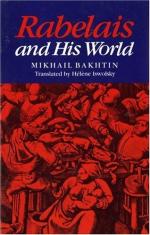
|
| Name: _________________________ | Period: ___________________ |
This quiz consists of 5 multiple choice and 5 short answer questions through Chapter 7, Chapter 2, Language of the Marketplace Cont..
Multiple Choice Questions
1. The prologue of _Pantagruel_ is a parody and travesty of:
(a) The fables of ancient Greece.
(b) The ecclesiastical persuasiveness of the Church.
(c) The pomp and circumstance of the aristocracy.
(d) The ignorance of the peasantry.
2. In Rabelais' time, why was the meaning of debasement often ambivalent?
(a) Because the debased person may choose to deflect the debasement.
(b) Because the person saying the insult never means it seriously.
(c) Because the head is quite separate from all the other parts of the body, spiritually and materially.
(d) Because the decaying or excretory organs are closely located to the regenerative genital organs.
3. Why are Rabelais' billingsgate elements considered "coarse and cynical" by most scholars?
(a) The Latin derivations of his scatological vocabulary mean "cynical."
(b) Many scholars believe that Rabelais himself was bitter from publication disputes.
(c) Many scholars interpret them only in a modern context.
(d) These elements express a deep distrust of contemporary society.
4. The verbal interactions between the Renaissance marketplace hawker and the crowd were above all:
(a) Timid and quiet.
(b) Abusive and derogatory.
(c) Free and frank.
(d) Distantly suggestive.
5. What is "man's second nature," according to Renaissance Christian doctrine?
(a) The celebratory but degrading impulse toward gluttony, scatology, and sex.
(b) The thoughtfulness of the individual mind.
(c) The way people act differently around those of another social class.
(d) Man's higher spiritual calling.
Short Answer Questions
1. What do Rabelais' various works indicate about the popular notion of urination?
2. According to Bakhtin's semiotic understanding, what irony is inherent within the creative power of language?
3. "Tripe" literally refers to:
4. Did the "unofficial" and "official" forms of speech ever coincide?
5. How does Rabelais accomplish the grotesque degradation of his target in the prologue to the Third Book?
|
This section contains 412 words (approx. 2 pages at 300 words per page) |

|




